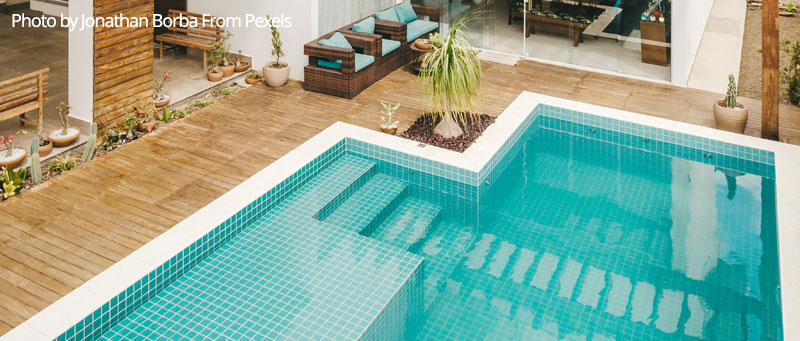Having a pool is an excellent part of your spring and summer fun. But as the cold season begins, we all have to close up our pools, but the way we do it can keep them protected and in good condition or leave you with expensive repairs next spring. Let’s dive into what a winter pool management plan looks like and what you should make sure is included.
The Right Winter Care for Your Pool
Winter pool management plans are vital to ensuring a hassle-free pool opening when the temperature rises. If you just throw the cover on your pool and hope for the best, you might face a variety of problems when you open your pool, such as algae growth and equipment damage.
With that in mind, let’s focus on the areas you should be concerned about during winter.
Water Chemistry
Monitor your water chemistry regularly throughout winter since unbalanced pool water can lead to corrosion, staining, algae growth, and scaling. If these issues get a foothold in the winter, they will cause more significant problems in the summer.
Your pool maintenance routine should ensure the water chemistry is balanced correctly and all winter chemicals are added. Closing your pool with the proper water chemistry can set you up for an easier pool opening in the spring and less hassle throughout the winter.
To make sure it stays balanced throughout the winter, pull back a corner of your winter or safety cover once a month and inspect the state of the water. Look for signs of algae growth, low water levels, or other issues requiring immediate attention. Also, use test kits or strips to check the water chemistry and sanitizer levels. After checking your water chemistry, it is a great time to pull out the skimmer and circulate the water, especially if you need to add chemicals because of an imbalance.
Note the following points about water chemistry during the winter pool management:
- Limit how much balancing you try to do during the winter since chemicals will not disperse the same when your pool water is stagnant. The chemicals can collect in one spot, causing surface discoloration and damage.
- Adding chlorine to ensure your levels stay between 1.0-4.0 ppm to ward off non-living organic contaminants. Chlorine-free shock can be added to winterized pools since it won’t bleach or create hot spots that can harm your pool’s surfaces.
- Enzymes and algaecides are two chemicals that can promote healthy water at opening time. Winter algaecide can combat algae growth throughout the cold season.
Pool Equipment
Before you close your pool, ensure all the water is cleared from the plumbing lines and equipment to avoid potential freeze damage in the pipes and equipment. You might even want to add a non-toxic pool antifreeze to the lines.
You should also perform these checks throughout the winter to keep your pool equipment in top shape.
- Check for signs of rodents in or around your pool equipment. Mice love to take up residence in pool heaters, especially if they are still operating.
- Keep the equipment drain plugs out to avoid water pooling inside the equipment and causing damage.
- Regularly check to ensure the power breaker to your pool equipment remains off so your pump doesn’t turn on while the lines are empty. If the pump turns on, you can end up with expensive damage to the pump and its components.
Pool Cover
Safety and solid winter covers keep debris and sunlight out of your pool, thus reducing the risk of contamination and algae growth. Throughout the winter, you should regularly check your pool cover to ensure it hasn’t come off or sustained any damage. Here are a few things to make a part of your winter pool management for your pool cover:
- Remove debris from the cover using a soft-bristled pool brush. If rainfall or ice accumulates on the cover, use a cover pump to remove the excess water. Don’t try to remove large piles of snow or frozen water, but wait until it melts first.
- Monitor cover straps and water bags by inspecting them throughout the winter to repair damage or secure the cover if it has become loose. Ensure you have safety cover hardware, water bags, and cover accessories for replacements due to damage that might occur in the winter.
- Repair cover damage quickly to avoid expensive repairs to your pool. If you have tears, rips, or sagging areas, those should be addressed immediately.
Importance of a Winter Pool Management Plan
These areas should be checked every month throughout the winter to avoid potential damage to your pool throughout the cold season. With that in mind, our team can help you winterize your pool and set up a routine pool maintenance schedule. Contact us today to schedule an appointment to review your pool’s current condition.
Mirage Pool Services specializes in pool maintenance, equipment repairs and replacement, chlorine washes, draining pools, and pool startups in the Moreno Valley and Riverside, California areas.

